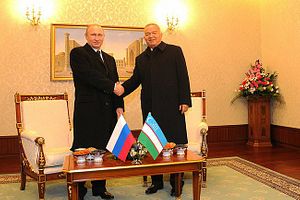At a tough time for Russia’s economy, Vladimir Putin is reaching out in the Central Asian neighborhood for friends. Landing before dawn on Wednesday in Tashkent, the Russian president was warmly received by his Uzbek counterpart, Islam Karimov. The large smiles captured by Uzbek television during the encounter suggested an amenable entente. The vast majority of Uzbek debt towards Moscow was to be written off and both parties knew that was going to facilitate additional talks.
Uzbekistan will pay only $25 million of the $890 million it owes Russia and will consider taking part in a free trade agreement with the Eurasian Economic Union, of which Russia, Belarus, and Kazakhstan are members. As the largest country (by population) in Central Asia, “Uzbekistan is one of Russia’s priority partners in the region,” said Putin, while referencing the leading role of his country in trade and economic relations with the Central Asian nation. That role remains relevant, even though auto sales from Uzbekistan, a traditional mainstay of trade transactions, dropped 35 percent in 2014. More positively, representatives of LUKoil, who accompanied the presidential delegation, gave assurances that the Russian energy company would keep investing in the Kandym gas condensate field in the Bukhara region, adding an additional $5 billion over the next 25 years. Overall, two-way trade is around $4 billion annually, with annual increases of 8-9 percent over the past couple of years. Notably, the two presidents cited two very different figures during their public statements, with Karimov boasting of an $8 billion yearly trade volume.
Putin and Karimov signed an important agreement to reach common ground on the settlement of mutual financial claims. The document was inked only days after Putin declared full amnesty for the return of capital held abroad, a move that denotes the need to substitute the loss of hard currency due to the massive capital flight of recent months. Unfortunately, nothing was disclosed to the press about the much anticipated discussion concerning the natural gas supplies from Uzbekistan to southern Kyrgyzstan, interrupted since last April.
Security played a big part of the meeting, albeit still disguised in economic clothes: The near-cancelation of Uzbek debt opened up new lines of credit that the two countries can pursue for the sale of arms and military technology. This is consistent with Putin and Karimov’s Central Asian security urges, given the constant instability of Afghanistan to the south. Nezavisimaya Gazeta expert Alexander Knyazev highlighted the general agreement of the two presidents on the key role of the Shanghai Cooperation Organization in the region: “The CSTO, from which Uzbekistan pulled out [in 2012], is considered to be a local force, unable to influence regional trends.”
Moscow faces serious challenges with the crisis in Ukraine, the free-fall of the ruble, and lower oil prices. None of these issues were discussed openly, although both leaders acknowledged the difficult moment for Russia. Writing off a debt accumulated in the 1990s, before the end of the ruble zone, while failing to clinch an economic deal between the Eurasian Economic Union and Uzbekistan might not be considered a victory for Putin. However, at a time of crisis, Karimov seems willing to answer in the roll-call of Moscow’s economic partners.

































